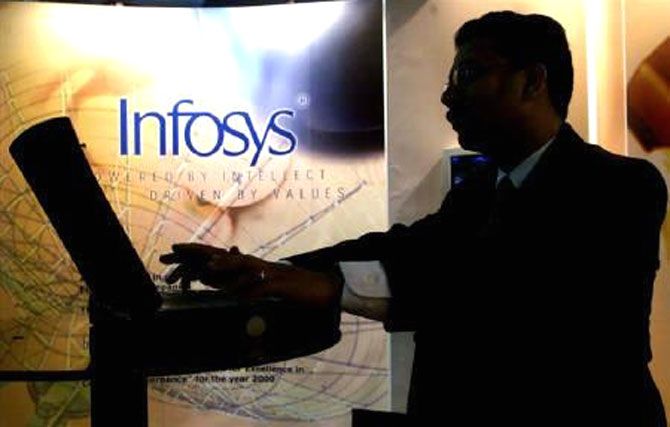'For non-Indians there were no raises, no promotions, no identity, no career path'
'Sikka stood for transparency, open-door communication'

Erin Green, bottom, left, former head of immigration at Infosys, who filed a lawsuit against the firm for unlawful sacking, says the resignation of Vishal Sikka from the post of managing director and chief executive officer was expected, as there was a clash of cultures at the firm.
In an email interview with Raghu Krishnan, Green says only the loss of a big client could push Infosys to correct its internal corporate culture.
What is your opinion of what has transpired with Sikka resigning?
What is going on now does not surprise me. We (Americans) were very optimistic when Sikka was hired. He lived in the US and was a Silicon Valley executive who could potentially understand the dynamics between two contrasting business cultures.
He stood for transparency, open-door communication and seemed like he wanted to engage with the US employee population. This was something new at Infosys.
But during his short stint, it seems like Sikka had so many issues and frustrations with those that hired him.
Do you see the exit of Sikka impacting the image of Infosys among clients in the US?
The hope with Sikka -- at least for US employees and I assume those in power in India who hired him -- was that he would represent a shift for Infosys from the completely India-centric model of governance, decision-making, to a more westernised, American approach.
 Of course, as we saw, that just became a battle, with not such a great ending.
Of course, as we saw, that just became a battle, with not such a great ending.
I can relate, as similar struggles were experienced in my group.
The issues we felt, as employees on the immigration team and in HR in Texas at Infosys, were just a microcosm of how the company was being run on a broader scale.
For non-Indians, especially, there were no raises, no promotions, no identity, no career path.
I thought it was a joke that I was the highest-ranking member in global immigration -- and certainly the most-experienced US immigration subject matter expert -- yet lower-level employees in India, or those with no US immigration background, were setting US immigration policy and making US immigration decisions.
My bosses in India consistently felt that our duties could easily be copied and performed by non-subject matter employees at the US immigration team in Bengaluru.
Do you see people who Sikka hired moving out?
I know he brought in (David) Kennedy as legal head, and he left a while ago.
Kennedy was professional, experienced and knowledgeable. He visited our office and met me when he was hired. I think he may have genuinely cared about our situation.
But for a new general counsel, especially an American, to facilitate an employment change that was much needed for our group was probably extremely difficult for him, because unfortunately it would have to be decided by the board members who were in India.
Three US law firms are saying they would file a class-action suit against Infosys. How would this impact the firm?
I do not know about the situation surrounding the Panaya deal that is surfacing now, but there is a class-action lawsuit filed in Minnesota in support of American workers, and my lawsuit.
Both uncover a blatant culture of discrimination and retaliation that is widespread at Infosys.
Companies will start realising how Infosys discriminates and retaliates against its own American employees. Especially, the ones Infosys (by their own internal whistle-blower policies) was supposed to protect by encouraging them to speak out and report such behaviour.
American companies will make this an issue in their choice of vendors.
Unfortunately, I feel that the loss of a big client, who takes an interest into what goes on within Infosys on US soil, is the only way Infosys will correct and change its internal corporate culture.
Does Infosys have whistle-blower policies to protect against discrimination and people who complain?
Oh sure, they do. They encourage employees to report such things. They promise protection and say that they take harassment, discrimination, even ‘unfair treatment’ seriously.
What they really do is investigate you, the complainer.
Infosys photograph (top): Savita Kirloskar/Reuters.











